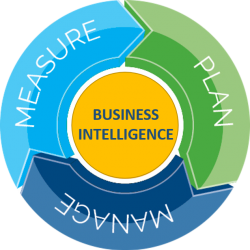What Do BI Tools Really Do For You?
 After years and thousands of deployments, it’s time to look back and reflect on the real benefits of Business Intelligence. The answer seems obvious but it’s worth some careful thought to help guide improvements in the future ― not only in BI products themselves, but how and when they are deployed.
After years and thousands of deployments, it’s time to look back and reflect on the real benefits of Business Intelligence. The answer seems obvious but it’s worth some careful thought to help guide improvements in the future ― not only in BI products themselves, but how and when they are deployed.
Over the years many developments have occurred, mostly sparked by the successes and failures of a range of BI projects not to mention technology advancements that have served to mold new BI tools. From the beginning, BI tools were in a race for survival with spreadsheets which have always had the support of users but lacked in connectivity and control. The race seems to have turned into a relay rather than a sprint since both tools now have long-distance endurance track records. If we put aside the small barriers to success such as cost justification, user friendliness and acceptance, we can get to the real measures of value of these type of enterprise visibility-creating solutions.
At the highest level, BI tools are management enablers that are provided through business insights from many different perspectives serving many different masters. Now let’s consider what I believe to be the four core values of successful business intelligence implementations that can be a means of evaluating their net worth to the enterprise.
Linking strategy to tactics is at the top of the list, allowing managers to continuously measure objectives and targets that tie back to corporate strategy. If this approach is combined with a well thought out hierarchy of key performance indicators, it will enlighten and guide managers through changing business climates. If managers are proactive instead of reactive, then chances are likely that their BI tools were partially responsible for it.
Business intelligence tools provide a level of governance of measurement methodology. Here is where the spreadsheets and BI tools tend to diverge in their effectiveness. As all of us know, spreadsheets have made our computational lives richer and easier ― sometimes with the risk of error-ridden models, but always with a degree of confidence. While providing the flexibility and ad hoc nature of spreadsheets, BI tools offer a degree of control by providing a common means of calculating important items such as profit, margin and growth. This control can obviously be overridden, but not without being noticed or buried in a maze of cell calculations.
Having a central repository for enterprise data means business intelligence tools provide a system of record from which managers can draw their conclusions. Again, in the race between spreadsheets and BI tools, spreadsheets tend to violate the rules by making personal data bases a favored source for analytics ―unquestionably useful but sometimes misinterpreted and many times not sharable or verifiable. Managers can rest assured that the data they draw from BI tools at least is common to everyone and tied to important enterprise data sources.
Last and certainly not least is the concept of promoting continuous improvement which is not unique to business intelligence tools but more likely the case than not when the tools are deployed properly. These tools help to identify and make visible for all to see potential gaps in performance between plans (strategy) and actual results (tactics). Planning, measuring and managing drives continuous improvement.
The role of business intelligence tools is to become a dial tone for business management teams to connect to opportunities and be proactive at solving the problems of the future.